Hold The Line!: Famous Last Stands of World War Two
Vercors:
July 1944
A Last Stand Inside A Last Stand
by Mike Haught
On 5 June 1944, Charles deGualle addressed the people of Vercors with a cryptic message: “Le chamois des Alpes bondit!” (The chamois of the Alps leaps forth!). It was a message that the secret members of the Forces Françaises Libres (Free French Forces) had been waiting to hear for many years. It signalled to the underground that the moment was upon them to begin a general uprising and help overthrow the Nazi occupiers and their treacherous collaborators.
|
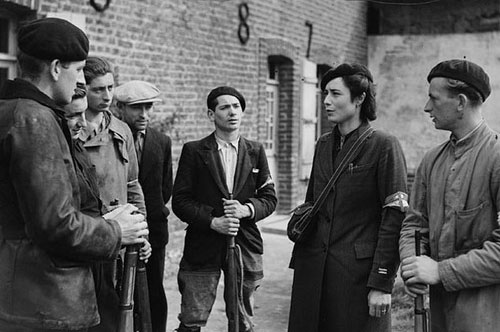 |
 |
The actual uprising was delayed a month to give
the Allies some time to help support the Free French. On 28 June 1944
Operational Group Justine, landed on the plateau to help organise the
Free French and distribute weapons. This elite group of 16 American
soldiers from the Office of Strategic Services (OSS) trained the 4000
Free French troops on using automatic weapons and bazookas. Hit-and-run
raids inflicted heavy casualties on the Germans and soon the guerrillas
were ready for a full-scale uprising.
On 3 July 1944, the Free French proclaimed Free Republic of Vercors. The German reaction was swift and terrible. Over 10,000 troops from the 157th Reserve Division quickly surrounded the Free French on the plateau, but the Allies kept the French supplied using a hastily constructed airfield near the village of Vassieux.
|
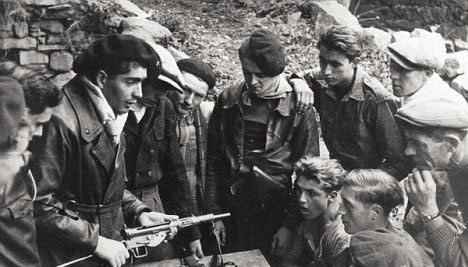
|
Once again, the Germans acted suddenly and
without warning when 24 DFS-230 assault gliders deposited two companies
of Brandenburgers right on top of the airfield. A very sharp fight
developed, with casualties high on both sides. The French quickly
surrounded the Brandengburgers but could not finish the job without more
heavy weapons.
Then more German paratroopers landed to reinforce the first wave. Now, about 400-men strong, the Germans regained the offensive. |
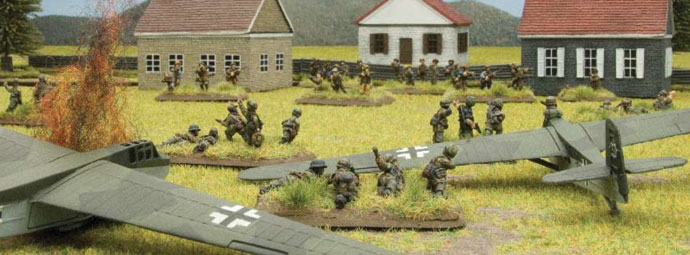 |
Trapped between the 157th Reserve Division and the paratroopers, the French stood little chance and the new republic was crushed mercilessly. Vercors was the scene of some of the worst war crimes committed against the French during the war, as Brandenburgers, Fallschirmjäger, and collaborationist French exacted cruel revenge, killing over 200 civilians.
The French and Americans that survived the encounter took to the nearby mountains and carried on their operations until the Allied liberation of France finally caught up with them.
~ Mike.
|
Kalamata:
April 1941
A Failed Dunkirk
by Phil Yates
In March 1941, Britain sent W Force to assist Greece, then threatened with German invasion. On 6 April 1941, the Germans invaded Greece, pushing aside the outnumbered second ANZAC Corps (the 6th Australian Division and
New Zealand Division) astride Mount Olympus on 15 April, then again at Thermopylae on the 23rd, reaching Athens on 27 April. Despite these defeats, the ANZAC Corps had bought time for much of W Force to be evacuated from the southern ports of Greece.
|
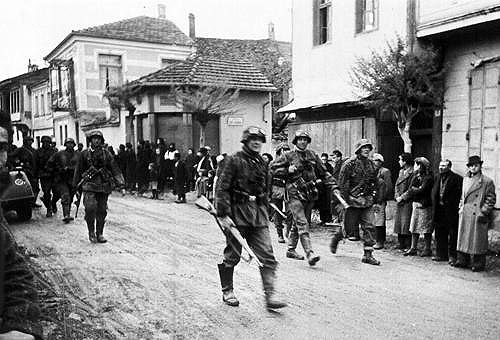 |
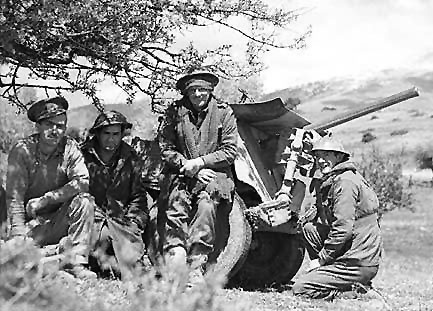 |
One of the last evacuations was at Kalamata (famed for its olives), near Sparta in the Peloponnese. The evacuation started with RAF elements being taken off in flying boats on the night of 24 April, and 8000 others departed with the Royal Navy on the night of 26 April, including most of two Australian brigades. The remaining 8000, including the NZ Reinforcement Battalion and elements of 24th and 28th (Maori) Battalions, were due to be taken off the next night. Unfortunately, the reconnaissance battalion of the German 5th Panzer Division arrived at Kalamata as dusk was falling.
|
Most of the troops awaiting evacuation were bivouacked in olive groves east of the town, trying to avoid the attentions of the German Air Force, when the Germans arrived. A hasty counterattack was organised, described by Driver Edmund Sharpin, Royal Army Service Corps:
“I was ordered to volunteer to drive my wagon into Kalamata. I picked up about twenty very unusual characters, all ‘volunteers’, but one young Aussie could have been a mountain - about 6’ 9” to 6’ 10”, maybe bigger. He carried a Boys anti-tank rifle with a bayonet permanently wired to it and he fired this gun from his shoulder. There were also some Kiwis and K.R.R.C’s (King’s Royal Rifle Corps) with Tommy guns and Brens but not too much ammunition.
After all was made ready we charged down the road onto the mole. We sped down the mole, came to a sharp stop and out we jumped, firing at anything that moved. To me it seemed only minutes, but all was cleared except for a German officer, in between the wheels of the 88mm gun. Up came the Aussie hulk with his Boys anti-tank rifle and fired through the wheel. So ended a German captain’s service to Hitler. With their hands up the rest of the Germans surrendered.
|
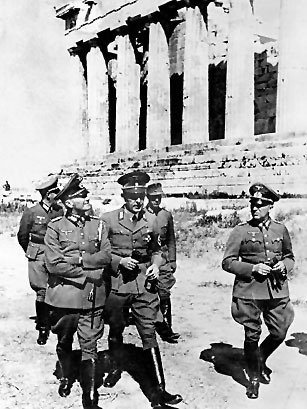
|
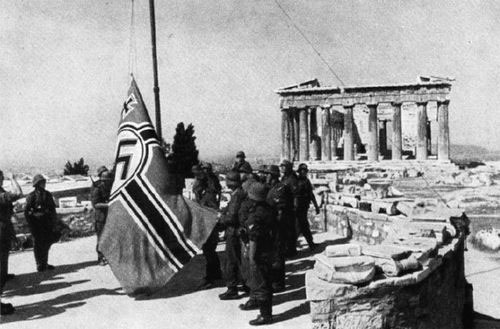 |
One thing now hit us. Our mouths were like cotton wool. Thirsty men and with no water around, we started to fight our way into the town and came to rest in a hotel-cum-bar on the front. I drank two bottles of beer straight down. I don’t drink alcohol but I shall never forget those two gorgeous bottles of beer. Then in swarmed the Hun and, for a period, street fighting was going good. But ammunition was short and tiredness beginning to show, also thirst.”
|
At the same time as the fighting on the waterfront, Sergeant Jack Hinton tried to flank the guns by going a block inland. Here he gained the VC by charging a machine-gun nest that was holding up the advance, taking a bullet in the guts in the process. The bravery of Hinton and many others drove the Germans from the town, only to discover that the Royal Navy was out of time and had to leave to get clear of the German Air Force. Only 332 soldiers (mostly wounded) were evacuated that night.
|
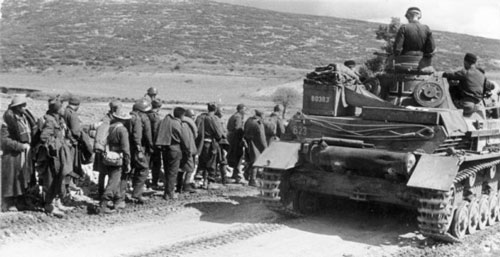 |
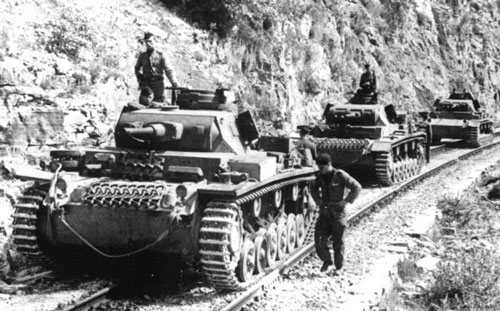 |
Bill Flint of the New Zealand 18th Battalion
recalled the end: “It was desperate. We realised we had to beat these
Germans before we could get away. …We had about 70 German prisoners
right at the wharf edge, and we fully expected to still go — get out —
and then a destroyer just zoomed past. It sort of semi-circled and
turned and went away and loud-hailed us: ‘Sorry boys, it’s late. We’ve
got to go.’ Not long after that … word circulated … that the brigadier,
whoever he was, a Pommie, I think, had unconditionally surrendered to
the Germans, who had offered him annihilation bombing if he didn’t.”
~ Phil.
|
John Daniel Hinton
War Office, October, 1941.
The KING has been graciously pleased to approve the award of the VICTORIA CROSS to the undermentioned: — No. 7930 Serjeant John Daniel Hinton, New Zealand Military Forces. On the night of 28th-29th April, 1941, during the fighting in Greece, a column of German armoured forces entered Kalamai; this column, which contained several armoured cars, 2” guns and 3” mortars, and two 6” guns, rapidly converged on a large force of British and New Zealand troops awaiting embarkation on the beach. When the order to retreat to cover was given, Serjeant Hinton, shouting “ to Hell with this, who’ll come with me,” ran to within several yards of the nearest gun; the gun fired, missing him, and he hurled two grenades, which completely wiped out the crew. He then came on with the bayonet followed by a crowd of New Zealanders. German troops abandoned the first 6” gun and retreated into two houses. Serjeant Hinton smashed the window and then the door of the. first house and dealt with the garrison with. the bayonet. He repeated the performance in the second house and as a result, until overwhelming German forces arrived, the New Zealanders held the guns. Serjeant Hinton then fell with a bullet wound through the lower abdomen and was taken prisoner.
|
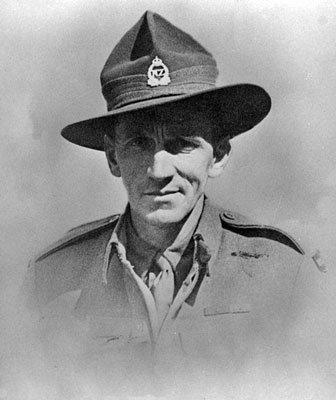 |
|
|